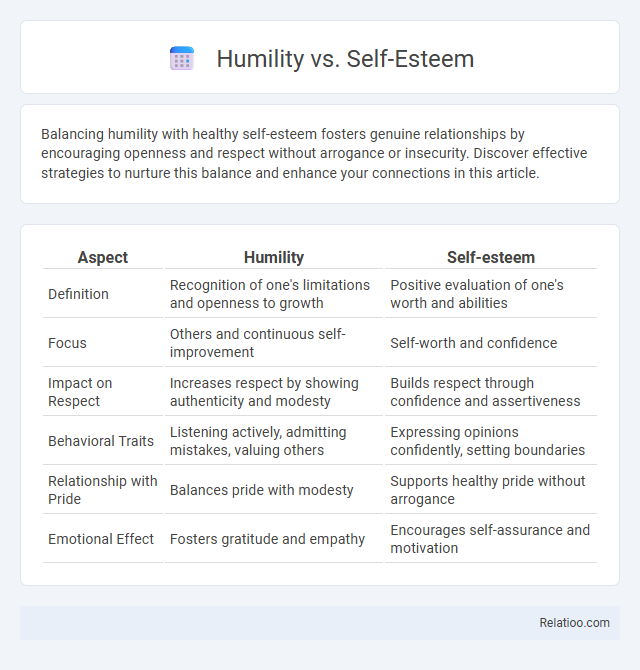Balancing humility with healthy self-esteem fosters genuine relationships by encouraging openness and respect without arrogance or insecurity. Discover effective strategies to nurture this balance and enhance your connections in this article.
Table of Comparison
| Aspect | Humility | Self-esteem |
|---|---|---|
| Definition | Recognition of one's limitations and openness to growth | Positive evaluation of one's worth and abilities |
| Focus | Others and continuous self-improvement | Self-worth and confidence |
| Impact on Respect | Increases respect by showing authenticity and modesty | Builds respect through confidence and assertiveness |
| Behavioral Traits | Listening actively, admitting mistakes, valuing others | Expressing opinions confidently, setting boundaries |
| Relationship with Pride | Balances pride with modesty | Supports healthy pride without arrogance |
| Emotional Effect | Fosters gratitude and empathy | Encourages self-assurance and motivation |
Introduction to Humility and Self-Esteem
Humility involves recognizing your limitations and valuing others without arrogance, fostering authentic connections. Self-esteem reflects your overall sense of self-worth and confidence, influencing motivation and resilience. Balancing humility and self-esteem helps you maintain confidence while staying grounded and approachable.
Defining Humility: Core Principles
Humility is defined by the core principles of self-awareness, modesty, and respect for others, emphasizing an accurate understanding of one's strengths and limitations without arrogance. Unlike self-esteem, which centers on valuing your own worth and capabilities, humility focuses on remaining grounded and open to growth. Cultivating humility fosters genuine connections and balanced self-perception, enriching both personal and professional relationships.
Understanding Self-Esteem: Key Concepts
Understanding self-esteem centers on recognizing your intrinsic worth and valuing yourself without excessive arrogance or undue self-criticism. It involves a balanced perception of your abilities and limitations, fostering confidence while remaining open to growth. Differentiating self-esteem from humility helps you maintain healthy self-respect alongside genuine modesty.
Humility vs Self-Esteem: Main Differences
Humility involves a realistic assessment of one's limitations and a lack of arrogance, while self-esteem reflects a positive evaluation of one's own worth and capabilities. Humility fosters openness to learning and acceptance of others, whereas self-esteem emphasizes confidence and self-respect. Both traits contribute to emotional well-being but differ in focus: humility centers on modesty, and self-esteem centers on self-appreciation.
The Psychological Benefits of Humility
Humility fosters psychological well-being by promoting realistic self-assessment and reducing ego-driven stress, distinguishing it from self-esteem, which centers on self-worth and confidence. Research shows that humility enhances empathy, strengthens social connections, and encourages openness to feedback, leading to personal growth and resilience. By embracing humility, your mental health benefits from increased emotional regulation and reduced narcissistic tendencies, supporting overall psychological balance.
The Role of Self-Esteem in Mental Health
Self-esteem plays a crucial role in mental health by providing a foundation for emotional resilience and positive self-perception. High self-esteem contributes to better stress management, reduced risk of depression, and enhanced social relationships. Balancing humility with healthy self-esteem fosters realistic self-awareness without undervaluing personal worth, promoting overall psychological well-being.
Balancing Humility and Self-Esteem
Balancing humility and self-esteem involves recognizing one's strengths and achievements without arrogance while maintaining an accurate self-perception and appreciation for others. Effective balance fosters resilience and growth by encouraging confidence tempered with openness to feedback and willingness to learn. Cultivating this equilibrium enhances interpersonal relationships and personal development by integrating self-respect with genuine humility.
Cultural Perspectives on Humility and Self-Esteem
Cultural perspectives on humility and self-esteem vary significantly, shaping how individuals express and value these traits. In collectivist societies, humility is often prized as it fosters social harmony and group cohesion, whereas individualistic cultures may emphasize self-esteem to promote personal achievement and confidence. Understanding these cultural differences can help you navigate social interactions more effectively by aligning your behavior with the prevalent cultural norms regarding humility and self-worth.
Common Misconceptions About Humility and Self-Esteem
Common misconceptions about humility and self-esteem often confuse humility with low self-worth and self-esteem with arrogance. Humility involves recognizing your strengths and weaknesses without exaggerated pride, while self-esteem is about valuing yourself confidently. Understanding that true humility supports healthy self-esteem can help you build balanced personal growth and interpersonal relationships.
Practical Tips for Cultivating Both Traits
Cultivating humility and self-esteem involves balancing self-awareness with confidence; practical tips include practicing active listening to acknowledge others' perspectives and setting realistic personal goals to build genuine self-worth. Regular self-reflection helps identify areas for growth, while affirming accomplishments without arrogance strengthens self-esteem. Embracing vulnerability fosters authentic relationships, which enhances humility and supports emotional resilience.

Infographic: Humility vs Self-esteem
 relatioo.com
relatioo.com